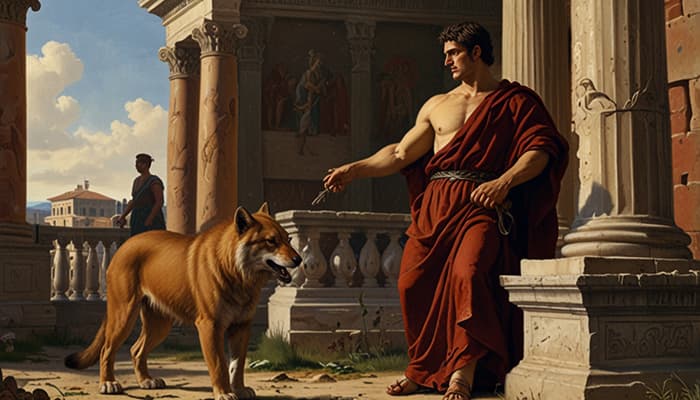Romulus and Remus: Born of Rome

Romulus and Remus: Born of Rome
Amid myth and legend, where gods walked among mortals, the story of Rome begins with the birth of two brothers—Romulus and Remus. A tale of betrayal, destiny, and the founding of the greatest empire the world has ever known.
- Our story starts not with the birth of the brothers, but generations before, in the kingdom of Alba Longa. It is here that their mother, Rhea Silvia, the daughter of a rightful king, would play a key role in Rome’s mythical origins.
- But Rhea Silvia’s fate would be sealed by the ambitions of her uncle, Amulius, who usurped the throne. Fearing that her children might challenge his rule, Amulius forced Rhea to become a Vestal Virgin—a priestess sworn to chastity under penalty of death.
- Yet, the gods had other plans. According to legend, the war god Mars visited Rhea in her temple. From their divine union, twin sons were born—Romulus and Remus.
Their birth was both a miracle and a curse. For Amulius, the existence of these sons was a threat to his rule.
Like many mythological stories, the twins’ lives began in peril. Amulius, determined to destroy any challenge to his power, ordered the infants to be cast into the Tiber River, left to the will of the gods.
But fate intervened. The river’s waters gently carried the basket to the base of Palatine Hill, where the twins were discovered by a she-wolf or Lupa.
Taken in by the she-wolf, Romulus and Remus survived, nurtured by the wild. According to legend, they were later found by a shepherd named Faustulus, who, along with his wife, raised the boys as their own.
Romulus and Remus grew into strong, capable leaders, but their true identity was never forgotten. Eventually, they learned of their royal lineage and the cruel fate that had befallen their family. Together, they returned to Alba Longa to overthrow their tyrant uncle, Amulius.
The brothers succeeded in restoring their grandfather, King Numitor, to the throne. But their ambitions stretched far beyond Alba Longa.
With their birthright secured, the twins sought a land of their own. They ventured to the hills along the Tiber, where they decided to build a new city. But it wasn’t long before rivalry and ambition drove a wedge between the brothers.
Romulus favored the Palatine Hill, while Remus preferred the Aventine. Unable to agree, they turned to augury—seeking signs from the gods through the flight of birds.
Romulus saw twelve birds, Remus only six. Interpreting this as a divine sign, Romulus began to lay the foundations of the city that would one day bear his name—Rome.
But the rivalry between the brothers only grew more heated. Remus mocked Romulus, even leaping over the city walls to demonstrate their vulnerability.
In a moment of rage, Romulus struck down his brother, killing him on the spot. Whether it was in a fit of fury or to defend his city’s honor, the result was the same. Romulus stood as the sole founder of Rome.
The fratricide left a dark shadow over the founding of Rome. Yet, the city would grow into one of the greatest civilizations of the ancient world, a beacon of power, culture, and law.
The story of Romulus and Remus is more than just a myth. It’s a reflection of the values, struggles, and ambitions that defined Rome itself—a city born of conflict, brotherhood, and the will to power.
Rome, under Romulus, grew from a small settlement to a kingdom, and eventually, under the Republic and Empire, into the capital of an empire that spanned continents.
And while the city has long outlasted its founders, the story of Romulus and Remus continues to echo through history, a reminder that even the greatest of civilizations can rise from the most humble—and sometimes violent—beginnings.
So, the next time you hear about the grandeur of Rome, remember its mythical origins, and the brothers whose story still shapes the city today.